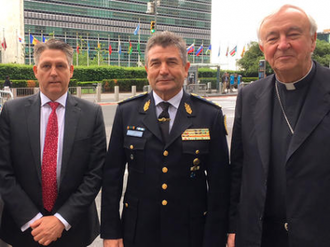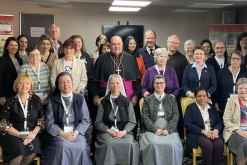New York: Cardinal Nichols addresses UN on human trafficking

Trust is a key component in fighting human trafficking, Cardinal Vincent Nichols told delegates at a United Nations conference this week. The Cardinal was addressing diplomats, law enforcement officials and charities involved in the support of survivors of human trafficking as president and chair of the Santa Marta Group.
The UN's Path to Peace initiative gave its annual award to the Santa Marta Group at a ceremony in New York. Cardinal Nichols and Kevin Hyland, senior adviser to the Santa Marta Group and first independent anti-slavery commissioner, called for greater collaboration between government, law enforcement, civil society, the Church and other non-government organisations.
Cardinal Nichols said: "This is an evil crime on an international scale and, as a former commissioner for the Metropolitan Police said, it requires a concerted international response, and that is where the Church comes in. I couldn't say that but that is what police chiefs see and is why this Santa Marta partnership is growing and seeing results locally. Not only is the Church active across the world, and we must salute the religious women who lead on this, but also victims of trafficking are often hidden within migrant communities. These communities can look out for possible victims and also those victims will often go to the Church as a trusted place where the first steps can be taken towards their rescue. Traumatised victims will trust religious sisters and that first step is essential."
This focus on trusted relationships was at the heart of Sr Melissa Camardo's address to the UN. She is one of the religious women who run the Lifeway Network, an inspiring charity that rehabilitates victims in a similar way to the work of Bakhita House in London. She said:
"Building trust takes time. It requires an honest assessment of failures as well as successes. Hearing police chiefs and Church leaders admit to failings demonstrates progress."
Cardinal Nichols reflected: "We need to recognise that organised crime is precisely that: organised. We are not. We need to develop these relationships and ensure the best local response by effecting and developing the resources of the Church and police across the world. To combat trafficking which exploits people, treating them as an expendable commodity where profit is the only motivation, requires a more powerful motivation. That motivation has to be a radical commitment to the human."
President of the UN General Assembly Miroslav Lajcak met with The Santa Marta Group and praised their approach. "This is a surprising alliance but effective," said Mr Lajcak.
During their visit to New York, Cardinal Nichols and Mr Hyland met with business leaders, focussing on the need to re-humanise their businesses. This need to put ethics at the centre of their businesses prompts slavery-free supply chains and also examining their fundamental business purpose.
The Santa Marta Group also met with director of the UN Office for Drugs and Crime, Simone Monasebian, who heads up the office with lead responsibility for the UN on trafficking, as well as assistant secretary-general victims' rights advocate Jane Connors.
In addition to encouraging co-ordinated action at the UN, Cardinal Nichols spent a morning with religious women, Catholic charities and US Immigration and Customs officials (who take the law enforcement lead on combatting human trafficking) in New Jersey, listening to their work on the ground.
The central message, and one where the Church is able to play an important role, was the need to work together with trusted relationships. Honesty in confronting issues and reassuring victims was one of the fruits of these trusted relationships. As one law enforcement official openly said: "In this broken world, law enforcement cannot achieve anything on its own."
To find out more about the Santa Marta Group go to: www.santamartagroup.com


















